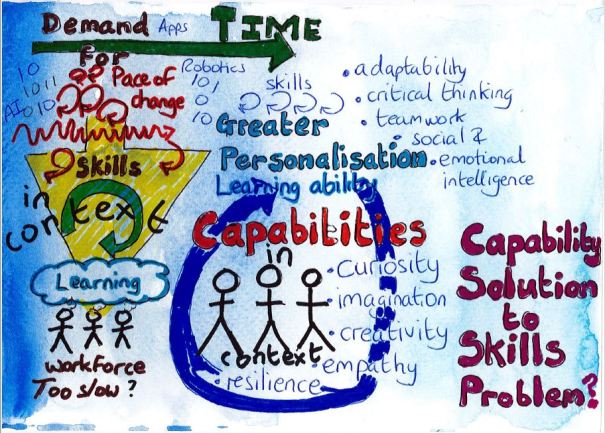“Skills change but capabilities endure – why fostering human capabilities first might be more important than reskilling in the future of work.” (Hagel et al., 2019)
This is the long title of a recent business article published by Deloitte Center for the Edge that has a “mission to identify and explore emerging opportunities” (Hagel et al., 2019, p.ii). The primary thrust of the article is that with the onset of rapidly changing needs for different skills with changes in technology, organisations should focus on nurturing the capabilities of staff first. Then they will be able to learn and use skills appropriately in their organisational contexts quicker and more effectively (Hagel et al., 2019).
A lot depends on the definitions used. For comparison I compare definitions of similar concepts of Hagel et al.’s article with a recent academic paper (see Table 1).
Table 1 Definitions: Skills, Knowledge, Competencies/Capabilities
|
Concept |
Definition |
|
| Gachino et al. (2018) | Hagel et al. (2019) | |
| Skills | “represents cognitive and practical abilities to perform certain functions.” [p. 1748] | “…the tactical knowledge or expertise needed to achieve work outcomes within a specific context.” [p.3] |
| Knowledge | “represents theoretical and factual aspects that can be learned through formal instructions or study…” [p. 1748] | |
| Competencies/
capabilities |
“[competencies] occur as a result of practice and reflection. They include autonomy and responsibility…” [p.1748-1749] | “[enduring human capabilities] [are] observable human attributes that are demonstrated independent of context…” [p.6] “Capabilities are what equip individuals to do things” [p.9] |
Although there are inconsistencies in definitions in literature, the idea that certain facets of employees (competencies/capabilities) are more deeply engrained and may enable them to be more proactive and effective in complex changing situations (see bottom row in Table 1 above) is common to some authors (e.g. Gachino et al. (2018) and Hagel et al. (2019)).
I have tried to represent these arguments in a picture (see Figure 1).
Figure 1 Capabilities and Changing Skills Needs

The increased demand for new skills and pressure to learn them comes with rapidly changing technology (see area on the left of Figure 1). When capabilities of staff are nurtured and grow (see area to the centre and to the right of Figure 1) the ability to learn and apply skills in context goes up and less training is required. So, staff who are more capable can solve problems and learn and apply skills quickly in complex changing situations.
This is one suggestion to address the problems organisations face with the changing skills requirements that come with technological change. If this line of thinking is accepted, then schools, universities and organisations may be well advised to invest their time and energy in nurturing capabilities. In my view, there is a lot of overlap between these concepts and I do not accept the definition of knowledge that Gachino et al. (2018) give (see Table 1). However, the broad thrust of the argument makes sense if the capabilities nurtured enable employees to learn, apply and adapt the relevant skills required.
Dr Peter Sharp
13th November 2019
References
Hagel, J., Seely Brown, J. and Wooll, M. (2019) Skills change but capabilities endure – why fostering human capabilities first might be more important than reskilling in the future of work, Deloitte Insights, The Deloitte Center for the Edge, [accessed from https://www2.deloitte.com/us/en/insights/focus/technology-and-the-future-of-work/future-of-work-human-capabilities.html on 13th November 2019].
Gachino, G. G. and Worku, G. B. (2019) Learning in Higher Education: Towards Knowledge, Skills and Competency Acquisition, International Journal of Education Management, Vol. 33, No. 7, pp 1746-1770s.